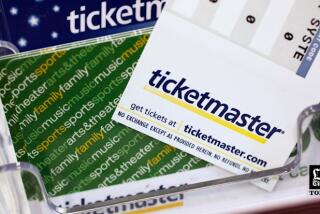Some Get a Fear of Flying on a Reissued Ticket
- Share via
Heavily discounted seats on scheduled airlines are touted in ads and by other means, and there are legitimate bargains. But there are also some possible pitfalls in buying such tickets, some of which may be stolen or originate from questionable sources.
Airline tickets are worth money, of course, and they are a means for persons seeking, legally or otherwise, to transfer large sums of money from currency-controlled countries into hard-currency areas.
These tickets, bought at low prices, are then sold in countries such as the United States to a minority of travel agents/consolidators who then reissue legitimate tickets for other domestic and international travel. In turn, these tickets can then be resold to still other travel agents in a chain ultimately reaching the consumer.
Airlines Are Losers
The big losers in this movement of tickets are the airlines. According to the International Airline Transport Assn., the indirect loss to carriers is about $200 million.
Eventually, when all the ticket coupons show up at the airlines’ central clearing houses and are matched up, the carriers used on the original tickets (and MCOs, or miscellaneous charge orders--documents issued by airlines or their agents requesting the issue of a ticket to the person named on the order) wind up paying dollars to other airlines on which travelers used reissued tickets.
And sometimes the airline’s money has to stay in the country with a controlled currency.
Occasional Problems
Generally, the traveler buying such a reissued ticket has no problem, although there have been cases of tickets being confiscated (airlines have a tally of blacklisted tickets). It would then be up to the traveler to seek a refund or new ticket from the agency. In either case, the traveler is likely to experience delay and probably embarrassment. Airlines reserve the right to question how you obtained the ticket.
“It’s rare that any passengers are actually stopped with such reissued tickets,” said an IATA spokesperson. “Only a minority of agents are involved with these kinds of tickets, and other agents are unhappy about the problem.”
In the long run, however, airline losses through this kind of ticket scam can obviously affect the level of fares.
Reissued tickets look like any other tickets. For example, they are refundable unless otherwise indicated. To tell if you have a reissued ticket, look at the “Form of Payment” box and the “Issued in Exchange” box. If it’s an exchange ticket you’ll see a 15-digit number (the first three digits indicate which airline issued the previous ticket, but not where).
Each time the ticket is reissued, the new ticket only bears the number of the previous ticket in the “Issued in Exchange” box, which will only have the original number the first time. After that, it can be a new number and a new airline. The first time the ticket is reissued, in effect, launders the ticket.
You can then try to find out (from airlines and travel agents) which airline is indicated by that three-digit code, and check with that carrier about the origin of the first ticket. It’s a complicated procedure, especially as some tickets are reissued several times, which makes it harder for the airlines to track them down.
‘Nigerian Connection’
One case in point is what some industry observers call the “Nigerian Connection.” Nigeria blocks any large movement of its currency out of the country, with this restriction also applying to airlines serving Lagos, its capital. Such carriers include Pan Am, British Caledonian, Air France, Lufthansa, etc. However, such airlines must sell tickets in Nigeria that are bought in the local currency.
One of the ways this restriction is bypassed is by buying a large number of airline tickets and MCOs, which are issued with names of travelers on them. “Nigeria has laws designed to prohibit illicit purchase of air tickets by citizens or residents, and this is to prevent resale of the tickets outside the country,” said a spokesperson for the Nigerian Consulate in New York. “But there are loopholes, and people try to beat the system.”
In this vein, such tickets may be improperly issued and validated. One dodge used, according to an industry spokesperson, is bribing travel agents in Lagos to issue tickets without the restriction stamped on them that such tickets are only refundable, endorsable and transferable in Nigeria.
Flooding the Market
Tickets gained in this fashion are then flown out of Nigeria in suitcases, and they have been flooding the market in the United States and Europe. While airlines are reluctant to discuss the problem, one spokesperson estimated that there are about $1 million worth of such tickets in the United States.
Meanwhile, the FBI and the airlines are investigating. “The FBI is working with other enforcement agencies on a Nigerian currency manipulation scheme that might involve possible mail fraud, fraud by wire and alteration of foreign currency,” said Jim Neilson of the FBI office in Los Angeles. “As much as $200 million could be lost by airlines through these tickets being peddled in the United States.”
Sellers of these Nigerian-issued tickets then seek travel agents in other markets to buy the tickets, which can be reissued (more than once).
“These people are willing to sell these tickets at a heavy discount, 50% and more off their face value, to get U.S. dollars,” explained Brian Clewer, president of Ambassador International Travel, a Los Angeles travel agency/consolidator. “Even at the heavy discount, they still make a fortune off these tickets, considering the original price they paid in Nigerian currency and whatever the extra consideration might have been.”
Clewer described one experience: “I received a call from a man I had never heard of. I never saw the tickets, but he told me he had 1,000 tickets in his hotel room for sale. I don’t deal in such operations, which can jeopardize our entire industry relationship, but with so much money involved I presumed he found another buyer.”
Big Risk, Big Reward
Clewer added, “These people look for agencies that aren’t in business for the long haul and who are willing to take a chance. If they’re caught, they can lose their (airline authorized) plates and be put out of business, but by then they might have rolled up a tidy little profit.”
The only industry rule such agents are breaking, according to Bill Jackman, a spokesman for ARC (Airlines Reporting Corp.), which handles travel agency administration for the domestic carriers, is that most airlines require agents to get their permission to reissue tickets based on their tickets.
“Agents trafficking in this market aren’t doing this,” Jackson said. “However, it’s up to the individual carrier to discipline the agent. But we’re looking at ways to tighten up the rules regarding ticket reissuance.”
One airline reaction came from Joe McGuiness, director of passenger sales for Pan Am in Los Angeles. “This is a problem and it’s proliferating, and we’re investigating every lead. We’re in contact with agents about such reissuance of tickets. Some agents may not realize the severity of the problem. If the problem persists, we may remove their plates.”
On the part of travel agents, Clewer said: “We all want to make money and offer tickets at the lowest possible cost, but this type of sub-rosa operation should be stamped out because it threatens the absolute confidence travel agents and passengers alike share in the validity of airline tickets.”
Self-Protection Action
Meanwhile, there are some measures travelers can take to protect themselves. Here are some tips suggested by Clewer and other industry sources.
If the ticket is issued on the ticket stock of an airline, you don’t have to worry: The airline is responsible. Look on the top left hand of the ticket. A carrier selling a block of bulk fare seats (often the type of discounted seats sold) to a travel agency/consolidator would have its name printed in this part of the ticket. A regular ticket issued by a travel agent would not have the name of the carrier in this position.
When you buy a ticket, the validation (look in the upper right-hand corner) should be from the agency that issued the ticket to you. This is the safest procedure. If you see that the ticket is issued by another agency, think twice.
If you’re offered a heavily discounted ticket, find out which airline is involved and call it to determine if it has seats at such a price. The bigger the discount, the more the need to check it out.
Pay by credit card. You may have to pay a surcharge, but then you can have the charge reversed if you have a problem.
Airlines may not accept the amount of a credit card purchase on a discounted ticket, as the price won’t match the going rate. As consolidators don’t want to bear the difference in cost if they permit you to use a credit card, they apply a surcharge.
But if you’re only allowed to pay in cash, be suspicious.
Last but hardly least, the presence of so many tickets emanating from questionable sources reinforces the need to use reputable travel agents.
As a public service, Brian Clewer, president of Ambassador International Travel, is offering to advise travelers with suspicions about reissued tickets they may have; call him at (213) 383-1287. “I can quickly tell if it’s an exchange ticket and which airline is involved, and the passenger can then check it out with the airline,” Clewer said.
More to Read
Sign up for The Wild
We’ll help you find the best places to hike, bike and run, as well as the perfect silent spots for meditation and yoga.
You may occasionally receive promotional content from the Los Angeles Times.






